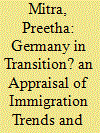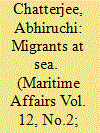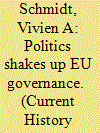| Srl | Item |
| 1 |
ID:
170656


|
|
|
|
|
| Summary/Abstract |
Since 2015, the strong resentment in Chinese social media against international immigration triggered by the European migrant crisis has been noticed, and in many cases harshly criticised, by foreign media. Using primary sources retrieved from a major microblogging site, this article provides a critical review of the way in which the crisis was represented in popular discourse between 2015 and 2017and explores the intricate sentiments it provoked. It employs the analytical framework of critical discourse analysis developed by Fairclough to illustrate how multi-dimensional discourse construction shaped the perceptions in social media. It argues that the mostly sensationalist narratives, created through recontextualisation of long-standing nationalist discourses, reflect the dilemma between China’s ambitious globalist vision for future development and the persistent myth of homogeneity of Chinese nationhood. As China undergoes a slow and reluctant transition from a traditional source of emigration to a budding destination for international immigrants, such a dilemma has broader implications for the Chinese perceptions of the European Other and China’s self-positioning in the world.
|
|
|
|
|
|
|
|
|
|
|
|
|
|
|
|
| 2 |
ID:
185644


|
|
|
|
|
| Summary/Abstract |
This article examines Germany’s response to the European migrant crisis of 2015–2016 by analysing immigration and identity debates in Germany and their impact on German politics. The refugee crisis sharply divided the European Union and raised questions relating to immigration, humanitarian assistance and the duties towards those fleeing war and persecution. In such a scenario, Chancellor Angela Merkel’s decision to admit more than a million refugees had deep ramifications not only for German politics but also European and international politics at large. After the initial wave of support subsided, xenophobic and right-wing factions emerged, and public opinion began to turn against Merkel. The emergence of such sentiments is at odds with Germany’s complicated relationship with nationalism and right-wing politics in the post-war era. It is this juxtaposition that the article aims to analyse; whether the response to the refugee crisis proves that Germany is on the path to becoming a more inclusive society despite the presence of deep-rooted xenophobic elements. In order to do so, this article has focused on the complex relationship between party politics, immigration trends and identity debates in Germany and its impact on contemporary German politics as a whole.
|
|
|
|
|
|
|
|
|
|
|
|
|
|
|
|
| 3 |
ID:
150590


|
|
|
|
|
| Summary/Abstract |
According to the United Nations, the current worldwide displacement is at the highest level ever recorded. Further, the humanitarian crises unfolding in the Mediterranean and the Bay of Bengal have focused the spotlight on the maritime domain as a prominent escape route. They have also raised many questions pertaining to human security and the humanitarian obligations of the states at one end of the spectrum and national security considerations that come with such mass arrivals on the other. However, the two crises have elicited varying responses by the affected state and non-state actors, who have interpreted international law and state obligations differently. This paper seeks to understand and analyse maritime and policy responses to the Syrians in the Mediterranean and the Rohingyas in the Bay of Bengal and Andaman Sea to identify the best practices for states to comply with their international humanitarian obligations while taking state security imperatives into consideration.
|
|
|
|
|
|
|
|
|
|
|
|
|
|
|
|
| 4 |
ID:
183725


|
|
|
|
|
| Summary/Abstract |
Over the last two decades, the European border regime has become the subject of a growing body of scholarship in critical security studies. In this article, I draw on Stuart Hall’s work on racialized policing, authoritarian populism and conjunctural analysis to argue that this literature has paid insufficient attention to the close relationship between racism, capitalism and state violence. Writing at the dawn of Thatcherism and neoliberal globalization, Hall theorized the growth in repressive state structures as a revanchist response to breakdowns in racial hegemony. Revisiting these insights, the article argues that the ongoing expansion of the European border regime is a hegemonic strategy of racialized crisis management. The imposition of ever more restrictive immigration policies, increased surveillance and heightened forms of deportability are attempts to defend white bourgeois order and to police a (neoliberal) racial formation in crisis. The migrant ‘crisis’ is ultimately the result of one racialized world order collapsing, and another struggling to be born.
|
|
|
|
|
|
|
|
|
|
|
|
|
|
|
|
| 5 |
ID:
171098


|
|
|
|
|
| Summary/Abstract |
EU governance, which was long apolitical and technocratic, with disagreements handled in private and deals made behind closed doors, has become more politically charged.
|
|
|
|
|
|
|
|
|
|
|
|
|
|
|
|